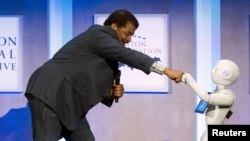The Pentagon has tapped some of science and technology's greatest minds to help innovate U.S. military capabilities and culture, and members of the panel say they will continue serving in the Trump administration if asked.
Eric Schmidt, the chairman of the board and chairman of Google's parent company, Alphabet, said he expects everyone to stay on to serve under retired General James Mattis, if the board is invited to continue its work.
"No one has told me they are leaving," Schmidt told reporters Monday at the Pentagon after the first board meeting since the presidential election.
Famed astrophysicist Neil deGrasse Tyson, a board member who said in November that Americans now have a four-year mission to "make America smart again," told reporters the board is there to serve the country, not one particular administration.
"I think there's a higher mission statement that we all live by here and expect that that will just continue," deGrasse Tyson said.
11 recommendations
The Defense Innovation Board was created by Defense Secretary Ash Carter in April 2016 to incorporate some of the technological innovations and practices of Silicon Valley into the military.
The board voted Monday to approve 11 recommendations for the Department of Defense, including appointing a new chief innovation officer, establishing a career track for computer scientists in the military, and assessing cyber security vulnerabilities of advanced weapons.
The board's recommendations also included establishing incentives for "bureaucracy busting" activities that provide barriers to innovation, along with establishing a Defense Department center for studying artificial intelligence, also known as AI.
"It's a matter of thinking of AI not as something to be done in pieces, but to be a fundamental core business of the military," deGrasse Tyson told reporters. "To think of it in some context other than that would really be to our own peril going forward."
Ten of the 15 Defense Innovation Board members attended Monday's meeting. Those attending included Marne Levine, the chief operating officer of Instagram, and Jennifer Pahlka, executive director of Code for America.





